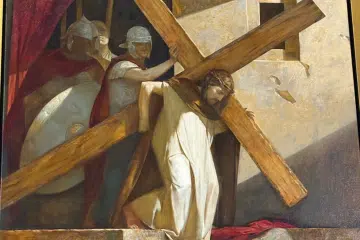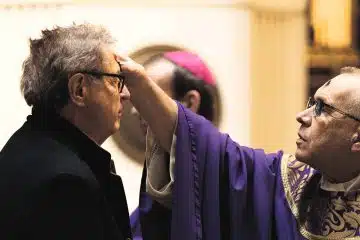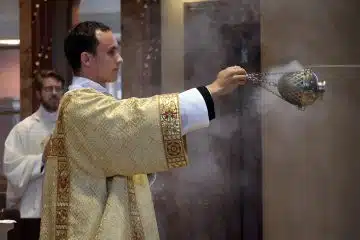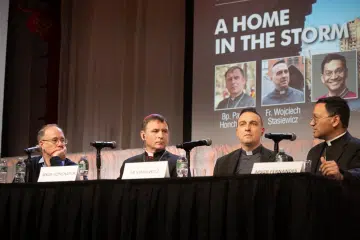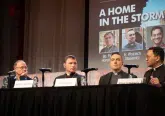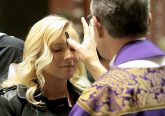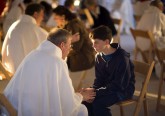Who will answer the call? Promoting vocations in a diverse culture
June 4, 2012
By Deacon Royce Winters
Over the last two years, the people of God in the Archdiocese of Cincinnati have joined their voices to pray the Prayer for Vocations written by Archbishop Dennis M. Schnurr.
Through prayer, we acknowledged that men and women down through the ages have responded to the call of God with a generous “yes.” Our prayer is for all vocations: priests, deacons, consecrated religious, husbands and wives and to the chaste single life.
On March 21, the Athenaeum of Ohio sponsored the George C. Findley Memorial Lecture. Msgr. C. Eugene Morris, STL, director of Sacred Liturgy and assistant professor of sacred theology at the Pontifical College Josephinum, gave a lecture titled, “What We Have Seen and Heard: Reflections on the History and Future of African American Vocations.” When I initially heard about the lecture, my heart leapt with joy that the Archdiocese of Cincinnati in praying for vocations was intentionally addressing the need for priestly vocations in the African- American community.
Msgr. Morris gave an excellent presentation that was filled with hope and faith. He stated, “In the oppressive reality of racism/segregation, the black church served as a meeting place.”
He further stated that the challenge for “blacks in America and in the church is to find a balance to living in two worlds, adding “the magisterium encouraged church leaders to raise up indigenous leaders for the whole church, and not just for the indigenous peoples.”
When I initially heard about the lecture, my heart leapt with joy that the archdiocese, in praying for vocations, was intentionally addressing the need for priestly vocations in the African-American community. This joy led me to dream about the Vocations Office and the Athenaeum of Ohio making a commitment to reach out to peoples of African, Asian, and Hispanic descent in an effort to “cultivate the soil” (Genesis 3:22-23) for the harvest God has in store for us.
In conversation with Father Kyle Schnippel, director of vocations, and Father Benedict O’Cinnsealaigh, rector of the seminary, it was very clear that they have a passion for vocations. It was also clear that they had not begun to implement a strategy to be intentional in addressing the need to reach out to the diversity of God’s people who will answer the call of God. I dare to dream that God is calling people of all races, colors, and ethnicities to serve as clergy and consecrated religious in this Archdiocese of Cincinnati. I thank Father Schnippe and Father O’Cinnsealaigh for their willingness to engage in the conversation to use our prophetic voices to call forth men and women to serve the Lord our God.
On March 17, 2010, Archbishop of Chicago Francis Cardinal George announced Father Augustus Tolton’s cause for sainthood. The cardinal appointed Auxiliary Bishop Joseph N. Perry as the postulator for the cause of Father Tolton. (http://www.toltoncanonization.org/) God willing, Father Tolton will be the first African American priest to be canonized as a saint. I invite pastoral ministers and encourage the sick to pray the prayer for the Cause for Canonization of Father Tolton. (http://www.toltoncanonization.org/prayer/canonizationprayer.html)
I look forward to the canonization of the Native American Mohawk, Kateri Tekawitha, on October 21, 2012 (http://www.lohud.com/article/20120219/NEWS05/120219001/Pope-canonize-Mohawk-Kateri-Tekakwitha-Oct-21). by Pope Benedict the XVI. Father Tolton and Tekawitha remind us that God has always been calling people of every tribe and nation.
In 2005, as I entered into a new phase of my life (recently retired from the Cincinnati Police Division) as the director of African American Catholic Ministries, I relied on the wisdom of several people. One of those was my mentor and friend, the late Father Clarence Joseph Rufus Rivers Jr. I can still hear the pain in his voice as he said, “We will never make-up for the loss of African-American vocations in this archdiocese.” He then told me a story about African-American men and women who had heard God’s call to the priesthood and religious life but were turned away because of their color.
Today, even though the doors of the seminary are open to all people, people of color have not responded, due to various reasons. One of those is that they have not been invited — intentionally invited — to break the threshold of the doors at the Athenaeum of Ohio. The invitation of welcome assists all of us to distinguish God’s voice from the cacophony of sounds in this 21st century.
The responsibility for inviting first belongs to the institutional church. But, it also belongs to each faith community, to each family, and to every individual to seek and empower others to hear the Lord’s call to holiness. We have a generation of young people who have never been asked to discern God’s call upon their life. It is time for us as parents, as teachers, as pastors, as catechists and as friends to teach the art of living.
As a convert, over the years I’ve had great mentors: Rhua Kepferle, Dee Bruggeman, Fathers Paul Rehling and Giles Pater, Ursuline Sister Mary Jerome Buchert and a loving and supportive wife. Each has played an important and integral role in assisting me to hear God’s voice in my life. They were and are men and women of great faith and prayer.
As the church gathers for the sacrament of baptism, the community processes to the baptismal font and sings that great prayer, the Litany of Saints. This great prayer reminds us that God has called people from every language, race, color and creed. And, God is still calling people to do God’s will. On May 27, we celebrated the feast of Pentecost. It is through the indwelling of the Holy Spirit that we encourage, engage and empower one another to listen intently to God’s voice. After we have listened and responded, it is then that we share the good news. God will bless us with men and women who will answer the call to vocations.
Deacon Winters is the director of the archdiocesan Office of African-American Catholic Ministries


